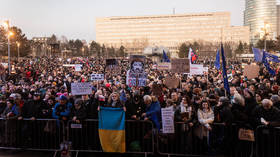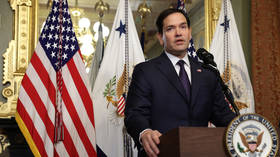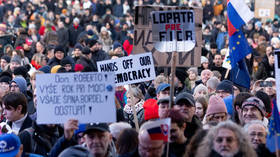EU could heed Iran’s demarche & ‘put US in its place’, but will it?
The ball is in the EU’s court after Tehran partially rowed back on its nuclear deal obligations. It could defy US global efforts to isolate Iran and salvage the deal, but may not have the political will to do so, analysts told RT.
The 2015 nuclear deal gave Iran relief from economic sanctions in exchange for accepting restrictions on its nuclear industry. The goal was to ensure that Iran could not rush towards creating a nuclear weapon – an ambition that Tehran always denied having – and integrate its economy closer with Western nations as part of fostering trust.
The deal however was from the start criticized by Israel, which wanted the West to have more confrontation with its regional rival. Once Donald Trump got elected as US president, the future of the agreement signed under his predecessor was left hanging in the balance. Exactly a year ago the US withdrew from the agreement and has since been trying to hurt Iran economically, including by threatening its business partners with secondary sanctions.
Iran’s démarche, on Wednesday, was timed with the US decision and was framed as an adequate response to America’s violation of its international obligations. What the country wants to achieve is to get its due, Seyed Mohammad Marandi, a professor at the University of Tehran, told RT.
“Iran doesn’t want any concessions. Iran simply wants the Europeans to abide by their commitments,” he said. “So far there has been absolutely nothing. Despite nice words, in reality they have been doing exactly as Trump has demanded.”
In addition to Iran and the US, the deal was signed by China, Russia and four European parties: Britain, Germany, France and the EU as an entity. Potential European business opportunities were a significant incentive for Iran to accept the deal and the Europeans promised they would do business in Iran despite pressure from Washington.
Also on rt.com ‘Reckless’ steps taken by US led to Iran’s decision on nuclear deal – KremlinIn practice, however, European companies were scared away by the threat of being blacklisted by the Americans – which may result in being blocked from the entire US-dominated global financial system and ruin almost any company.
The Europeans promised to create a mechanism that would allow dodging US financial surveillance, but it is nowhere close to being operational, said Igor Pankratenko, a Middle East researcher and author. “The so-called special mechanism simply doesn’t work. And there is no chance this problem can be solved in the nearest future,” he told RT.
Marandi believes that if the EU were really committed to standing up to the US and saving the deal, they would have been far more efficient. By joining forces with Russia and China on this issue, the Europeans have enough weight to oppose Washington, he said.
If the European Union is serious, they can work with the Russians and the Chinese and would find a solution. If the Europeans are serious, they have more than enough leverage to put the Americans in their place.
China and Russia could also help resolve the issue by creating an alternative to the defective European workaround for the sanctions, Pankratenko suggested.
“The solution is obvious. What Tehran really needs is dodging sanctions. There are talks between Iran and China about it. Some issues they are trying to resolve through Moscow,” he said. “The process is complex and closed from the public, but if it succeeds at least partially and the governments of Russia and China chose to simply ignore some of the sanctions, it would give Tehran a reason to tone down its rhetoric.”
After Tehran’s move on Wednesday, both Moscow and Beijing blamed the US for pressuring Iran and said they believed the nuclear deal was worthy of saving.
Like this story? Share it with a friend!















